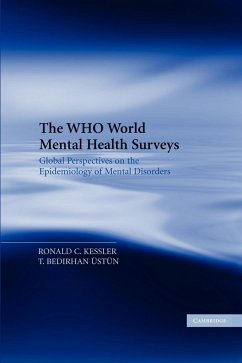Ronald Kessler / T. Bedirhan Ustun (ed.)Global Perspectives on the Epidemiology of Mental Disorders
The Who World Mental Health Surveys
Global Perspectives on the Epidemiology of Mental Disorders
Herausgeber: Kessler, Ronald; Ustun, T. Bedirhan
Ronald Kessler / T. Bedirhan Ustun (ed.)Global Perspectives on the Epidemiology of Mental Disorders
The Who World Mental Health Surveys
Global Perspectives on the Epidemiology of Mental Disorders
Herausgeber: Kessler, Ronald; Ustun, T. Bedirhan
- Gebundenes Buch
- Merkliste
- Auf die Merkliste
- Bewerten Bewerten
- Teilen
- Produkt teilen
- Produkterinnerung
- Produkterinnerung
This book reports the first results of the WHO World Mental Health (WMH) Survey Initiative.
Andere Kunden interessierten sich auch für
![The Cambridge Handbook of Stigma and Mental Health The Cambridge Handbook of Stigma and Mental Health]() The Cambridge Handbook of Stigma and Mental Health166,99 €
The Cambridge Handbook of Stigma and Mental Health166,99 €![Leaders Who Lust Leaders Who Lust]() Barbara KellermanLeaders Who Lust35,99 €
Barbara KellermanLeaders Who Lust35,99 €![What in the World is E-mental Health? What in the World is E-mental Health?]() Austin MardonWhat in the World is E-mental Health?23,99 €
Austin MardonWhat in the World is E-mental Health?23,99 €![Hauntings - Dispelling the Ghosts Who Run Our Lives Hauntings - Dispelling the Ghosts Who Run Our Lives]() James HollisHauntings - Dispelling the Ghosts Who Run Our Lives30,99 €
James HollisHauntings - Dispelling the Ghosts Who Run Our Lives30,99 €![Hauntings - Dispelling the Ghosts Who Run Our Lives Hauntings - Dispelling the Ghosts Who Run Our Lives]() James HollisHauntings - Dispelling the Ghosts Who Run Our Lives42,99 €
James HollisHauntings - Dispelling the Ghosts Who Run Our Lives42,99 €![The Girl Who Disappeared The Girl Who Disappeared]() Clifford Griffith RoeThe Girl Who Disappeared37,99 €
Clifford Griffith RoeThe Girl Who Disappeared37,99 €![For Those Who Can't: The Story of the First U.S. North-South Bicycle Record For Those Who Can't: The Story of the First U.S. North-South Bicycle Record]() Brendan WalshFor Those Who Can't: The Story of the First U.S. North-South Bicycle Record21,99 €
Brendan WalshFor Those Who Can't: The Story of the First U.S. North-South Bicycle Record21,99 €-
-
-
This book reports the first results of the WHO World Mental Health (WMH) Survey Initiative.
Hinweis: Dieser Artikel kann nur an eine deutsche Lieferadresse ausgeliefert werden.
Hinweis: Dieser Artikel kann nur an eine deutsche Lieferadresse ausgeliefert werden.
Produktdetails
- Produktdetails
- Verlag: Cambridge University Press
- Seitenzahl: 600
- Erscheinungstermin: 12. Oktober 2011
- Englisch
- Abmessung: 260mm x 183mm x 36mm
- Gewicht: 1308g
- ISBN-13: 9780521884198
- ISBN-10: 0521884195
- Artikelnr.: 23603656
- Herstellerkennzeichnung
- Libri GmbH
- Europaallee 1
- 36244 Bad Hersfeld
- gpsr@libri.de
- Verlag: Cambridge University Press
- Seitenzahl: 600
- Erscheinungstermin: 12. Oktober 2011
- Englisch
- Abmessung: 260mm x 183mm x 36mm
- Gewicht: 1308g
- ISBN-13: 9780521884198
- ISBN-10: 0521884195
- Artikelnr.: 23603656
- Herstellerkennzeichnung
- Libri GmbH
- Europaallee 1
- 36244 Bad Hersfeld
- gpsr@libri.de
Dr Ronald C. Kessler is Professor in the Department of Health Care Policy at Harvard Medical School.
Dr T. Bedirhan Ustun works in the Classification, Assessment, Surveys and Terminology Division of the Department of Health Financing and Stewardship at the World Health Organization, Geneva, Switzerland.
Dr T. Bedirhan Ustun works in the Classification, Assessment, Surveys and Terminology Division of the Department of Health Financing and Stewardship at the World Health Organization, Geneva, Switzerland.
Acknowledgements; Contributors; Part I. Methods: 1. Introduction; 2. Sample
designs and sampling procedures; 3. Implementation of the World Mental
Health Surveys; 4. The World Health Organization composite international
diagnostic interview; 5. Translation procedures and translation assessment
in the World Mental Health Survey Initiative; 6. Concordance of the
Composite International Diagnostic Interview Version 3.0 (CIDI 3.0) with
standardized clinical assessments in the WHO World Mental Health Surveys;
Part II. Country Specific Chapters: WHO Regional Office for the Americas
(AMRO): 7. Mental disorders in Colombia: results from the World Mental
Health Survey; 8. The Mexican National Comorbidity Survey (M-NCS): overview
and results; 9. The National Comorbidity Survey Replication (NCS-R):
cornerstone in improving mental health and mental health care in the United
States; WHO Regional Office for Africa (AFRO): 10. Mental disorders among
adult Nigerians: risks, prevalence, and treatment; 11. The South African
Stress and Health Survey (SASH): a foundation for improving mental health
care in South Africa; WHO Regional Office for the Eastern Mediterranean
Regional Office (EMRO): 12. Mental disorders and war in Lebanon; WHO
Regional Office for Europe (EURO): 13. Mental health in Belgium: current
situation and future perspectives; 14. The prevalence of mental disorders
and services use in France: results from a national survey 2001-2; 15.
Prevalence and treatment of mental disorders in Germany: results from the
European Study of the Epidemiology of Mental Disorders (ESEMeD) survey; 16.
The prevalence of mental disorders and service use in Israel: results from
the national health survey 2003-4; 17. The prevalence of mental disorders
and service use in Italy: results from the national health survey 2001-3;
18. Mental disorders and service use in the Netherlands: results from the
European Study of the Epidemiology of Mental Disorders (ESEMeD); 19. The
epidemiology of mental disorders in the general population of Spain; 20.
The state of mental health and alcoholism in Ukraine; WHO Regional Office
for the Western Pacific (WPRO): 21. Mental disorders and service use in
China; 22. Twelve-month prevalence, severity and treatment of common mental
disorders in communities in Japan: the World Mental Health Japan 2003-4
Survey; 23. Te Rau Hinengaro: the New Zealand Mental Health Survey; Part
III. Cross-National Comparisons: 24. Lifetime prevalence and age of onset
distributions of mental disorders in the World Mental Health Survey
Initiative; 25. Delay and failure in treatment seeking after first onset of
mental disorders in the World Mental Health Survey Initiative; 26.
Prevalence and severity of mental disorders in the World Mental Health
Survey Initiative; 27. Recent treatment of mental disorders in the World
Mental Health Survey Initiative; Part IV. Conclusions: 28. Overview and
future directions for the World Mental Health Survey Initiative; Index.
designs and sampling procedures; 3. Implementation of the World Mental
Health Surveys; 4. The World Health Organization composite international
diagnostic interview; 5. Translation procedures and translation assessment
in the World Mental Health Survey Initiative; 6. Concordance of the
Composite International Diagnostic Interview Version 3.0 (CIDI 3.0) with
standardized clinical assessments in the WHO World Mental Health Surveys;
Part II. Country Specific Chapters: WHO Regional Office for the Americas
(AMRO): 7. Mental disorders in Colombia: results from the World Mental
Health Survey; 8. The Mexican National Comorbidity Survey (M-NCS): overview
and results; 9. The National Comorbidity Survey Replication (NCS-R):
cornerstone in improving mental health and mental health care in the United
States; WHO Regional Office for Africa (AFRO): 10. Mental disorders among
adult Nigerians: risks, prevalence, and treatment; 11. The South African
Stress and Health Survey (SASH): a foundation for improving mental health
care in South Africa; WHO Regional Office for the Eastern Mediterranean
Regional Office (EMRO): 12. Mental disorders and war in Lebanon; WHO
Regional Office for Europe (EURO): 13. Mental health in Belgium: current
situation and future perspectives; 14. The prevalence of mental disorders
and services use in France: results from a national survey 2001-2; 15.
Prevalence and treatment of mental disorders in Germany: results from the
European Study of the Epidemiology of Mental Disorders (ESEMeD) survey; 16.
The prevalence of mental disorders and service use in Israel: results from
the national health survey 2003-4; 17. The prevalence of mental disorders
and service use in Italy: results from the national health survey 2001-3;
18. Mental disorders and service use in the Netherlands: results from the
European Study of the Epidemiology of Mental Disorders (ESEMeD); 19. The
epidemiology of mental disorders in the general population of Spain; 20.
The state of mental health and alcoholism in Ukraine; WHO Regional Office
for the Western Pacific (WPRO): 21. Mental disorders and service use in
China; 22. Twelve-month prevalence, severity and treatment of common mental
disorders in communities in Japan: the World Mental Health Japan 2003-4
Survey; 23. Te Rau Hinengaro: the New Zealand Mental Health Survey; Part
III. Cross-National Comparisons: 24. Lifetime prevalence and age of onset
distributions of mental disorders in the World Mental Health Survey
Initiative; 25. Delay and failure in treatment seeking after first onset of
mental disorders in the World Mental Health Survey Initiative; 26.
Prevalence and severity of mental disorders in the World Mental Health
Survey Initiative; 27. Recent treatment of mental disorders in the World
Mental Health Survey Initiative; Part IV. Conclusions: 28. Overview and
future directions for the World Mental Health Survey Initiative; Index.
Acknowledgements; Contributors; Part I. Methods: 1. Introduction; 2. Sample
designs and sampling procedures; 3. Implementation of the World Mental
Health Surveys; 4. The World Health Organization composite international
diagnostic interview; 5. Translation procedures and translation assessment
in the World Mental Health Survey Initiative; 6. Concordance of the
Composite International Diagnostic Interview Version 3.0 (CIDI 3.0) with
standardized clinical assessments in the WHO World Mental Health Surveys;
Part II. Country Specific Chapters: WHO Regional Office for the Americas
(AMRO): 7. Mental disorders in Colombia: results from the World Mental
Health Survey; 8. The Mexican National Comorbidity Survey (M-NCS): overview
and results; 9. The National Comorbidity Survey Replication (NCS-R):
cornerstone in improving mental health and mental health care in the United
States; WHO Regional Office for Africa (AFRO): 10. Mental disorders among
adult Nigerians: risks, prevalence, and treatment; 11. The South African
Stress and Health Survey (SASH): a foundation for improving mental health
care in South Africa; WHO Regional Office for the Eastern Mediterranean
Regional Office (EMRO): 12. Mental disorders and war in Lebanon; WHO
Regional Office for Europe (EURO): 13. Mental health in Belgium: current
situation and future perspectives; 14. The prevalence of mental disorders
and services use in France: results from a national survey 2001-2; 15.
Prevalence and treatment of mental disorders in Germany: results from the
European Study of the Epidemiology of Mental Disorders (ESEMeD) survey; 16.
The prevalence of mental disorders and service use in Israel: results from
the national health survey 2003-4; 17. The prevalence of mental disorders
and service use in Italy: results from the national health survey 2001-3;
18. Mental disorders and service use in the Netherlands: results from the
European Study of the Epidemiology of Mental Disorders (ESEMeD); 19. The
epidemiology of mental disorders in the general population of Spain; 20.
The state of mental health and alcoholism in Ukraine; WHO Regional Office
for the Western Pacific (WPRO): 21. Mental disorders and service use in
China; 22. Twelve-month prevalence, severity and treatment of common mental
disorders in communities in Japan: the World Mental Health Japan 2003-4
Survey; 23. Te Rau Hinengaro: the New Zealand Mental Health Survey; Part
III. Cross-National Comparisons: 24. Lifetime prevalence and age of onset
distributions of mental disorders in the World Mental Health Survey
Initiative; 25. Delay and failure in treatment seeking after first onset of
mental disorders in the World Mental Health Survey Initiative; 26.
Prevalence and severity of mental disorders in the World Mental Health
Survey Initiative; 27. Recent treatment of mental disorders in the World
Mental Health Survey Initiative; Part IV. Conclusions: 28. Overview and
future directions for the World Mental Health Survey Initiative; Index.
designs and sampling procedures; 3. Implementation of the World Mental
Health Surveys; 4. The World Health Organization composite international
diagnostic interview; 5. Translation procedures and translation assessment
in the World Mental Health Survey Initiative; 6. Concordance of the
Composite International Diagnostic Interview Version 3.0 (CIDI 3.0) with
standardized clinical assessments in the WHO World Mental Health Surveys;
Part II. Country Specific Chapters: WHO Regional Office for the Americas
(AMRO): 7. Mental disorders in Colombia: results from the World Mental
Health Survey; 8. The Mexican National Comorbidity Survey (M-NCS): overview
and results; 9. The National Comorbidity Survey Replication (NCS-R):
cornerstone in improving mental health and mental health care in the United
States; WHO Regional Office for Africa (AFRO): 10. Mental disorders among
adult Nigerians: risks, prevalence, and treatment; 11. The South African
Stress and Health Survey (SASH): a foundation for improving mental health
care in South Africa; WHO Regional Office for the Eastern Mediterranean
Regional Office (EMRO): 12. Mental disorders and war in Lebanon; WHO
Regional Office for Europe (EURO): 13. Mental health in Belgium: current
situation and future perspectives; 14. The prevalence of mental disorders
and services use in France: results from a national survey 2001-2; 15.
Prevalence and treatment of mental disorders in Germany: results from the
European Study of the Epidemiology of Mental Disorders (ESEMeD) survey; 16.
The prevalence of mental disorders and service use in Israel: results from
the national health survey 2003-4; 17. The prevalence of mental disorders
and service use in Italy: results from the national health survey 2001-3;
18. Mental disorders and service use in the Netherlands: results from the
European Study of the Epidemiology of Mental Disorders (ESEMeD); 19. The
epidemiology of mental disorders in the general population of Spain; 20.
The state of mental health and alcoholism in Ukraine; WHO Regional Office
for the Western Pacific (WPRO): 21. Mental disorders and service use in
China; 22. Twelve-month prevalence, severity and treatment of common mental
disorders in communities in Japan: the World Mental Health Japan 2003-4
Survey; 23. Te Rau Hinengaro: the New Zealand Mental Health Survey; Part
III. Cross-National Comparisons: 24. Lifetime prevalence and age of onset
distributions of mental disorders in the World Mental Health Survey
Initiative; 25. Delay and failure in treatment seeking after first onset of
mental disorders in the World Mental Health Survey Initiative; 26.
Prevalence and severity of mental disorders in the World Mental Health
Survey Initiative; 27. Recent treatment of mental disorders in the World
Mental Health Survey Initiative; Part IV. Conclusions: 28. Overview and
future directions for the World Mental Health Survey Initiative; Index.








